Key takeaways:
- Metal music culture fosters a deep sense of belonging, identity, and community among fans, allowing expression of shared struggles.
- Achieving balance in life is essential for mental well-being, as it prevents one passion, like music, from overshadowing other important aspects.
- Effective time management helps musicians prioritize commitments and can boost creativity, especially when combined with restorative breaks.
- Sharing experiences with bandmates strengthens bonds, fosters collaboration, and transforms individual struggles into collective creativity.
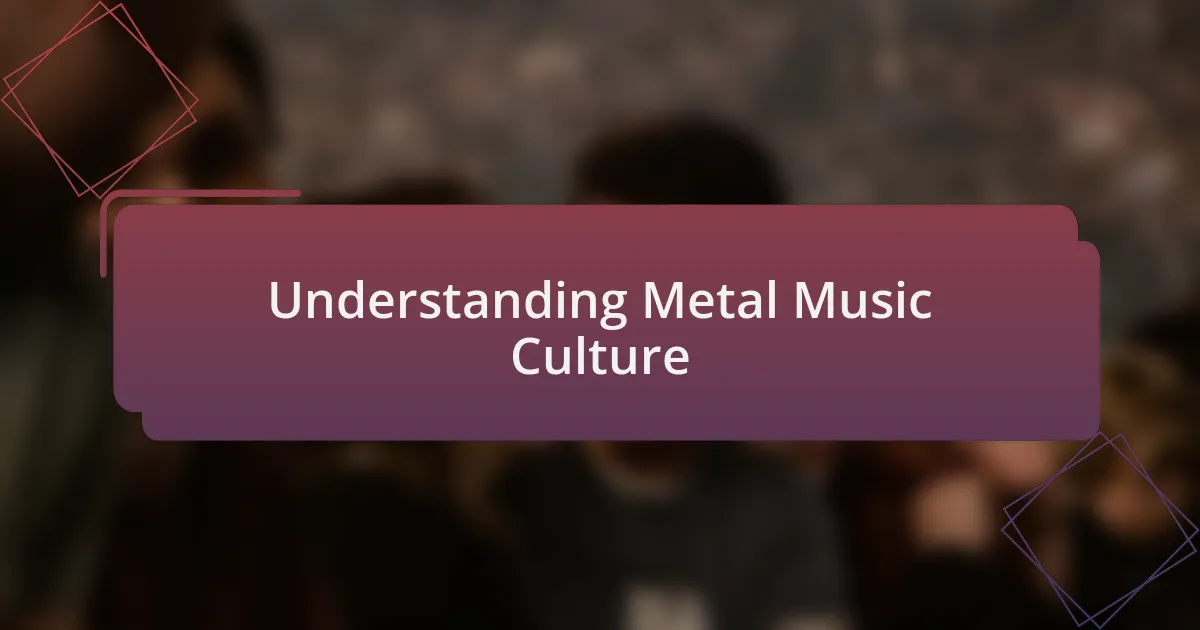
Understanding Metal Music Culture
Metal music culture is a unique blend of identity, passion, and community that draws individuals together in powerful ways. I remember my first metal concert; the energy in the room was electric, a shared heartbeat among strangers. Have you ever felt that connection with others over the love for a particular band? It’s this sense of belonging that makes metal culture so compelling.
At its core, metal is about expressing intensity and exploring themes that often delve into the darker aspects of life. I often find solace in lyrics that speak to pain and struggle. It’s a stark reminder that we are not alone in our struggles; metal bands often lay bare their vulnerabilities, connecting deeply with fans. Isn’t it fascinating how a few chords can resonate so profoundly across different lives?
The culture surrounding metal extends beyond music; it encompasses lifestyle, fashion, and even art. I often think about the iconic imagery found in album covers and merchandise, each telling a story that complements the music. Do you see those vibrant expressions reflected in how metalheads carry themselves? It’s a form of rebellion, a celebration of individuality, and it fosters a strong sense of identity within the community.
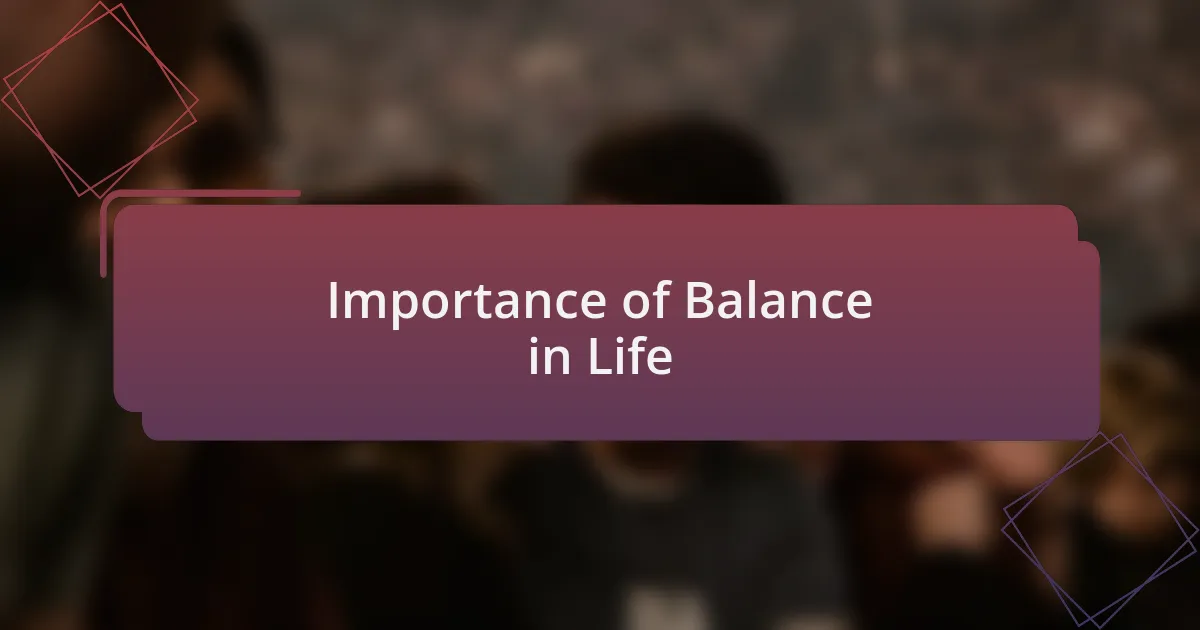
Importance of Balance in Life
Finding balance in life is crucial for maintaining mental and emotional well-being. Personally, I’ve noticed that when I focus too heavily on music, I sometimes neglect other important aspects of my life, like relationships and self-care. Have you ever felt overwhelmed by a singular passion? Achieving equilibrium means ensuring that no single pursuit overshadows everything else.
For instance, I once dedicated an entire month to preparing for a big gig, pouring every ounce of energy into rehearsals. While it was rewarding, I found myself feeling drained and disconnected from my friends and family. This experience taught me that while passion is vital, harmony is equally important. What strategies do you use to ensure you don’t lose sight of your other commitments in the pursuit of your passions?
Ultimately, balance empowers creativity and energy, allowing us to thrive in multiple areas of our lives. I’ve realized that my best ideas often come when I’m not solely focused on music—when I carve out time for social activities, exploring new interests, or simply enjoying life outside of my band. Isn’t it interesting how stepping away can ignite inspiration rather than diminish it?
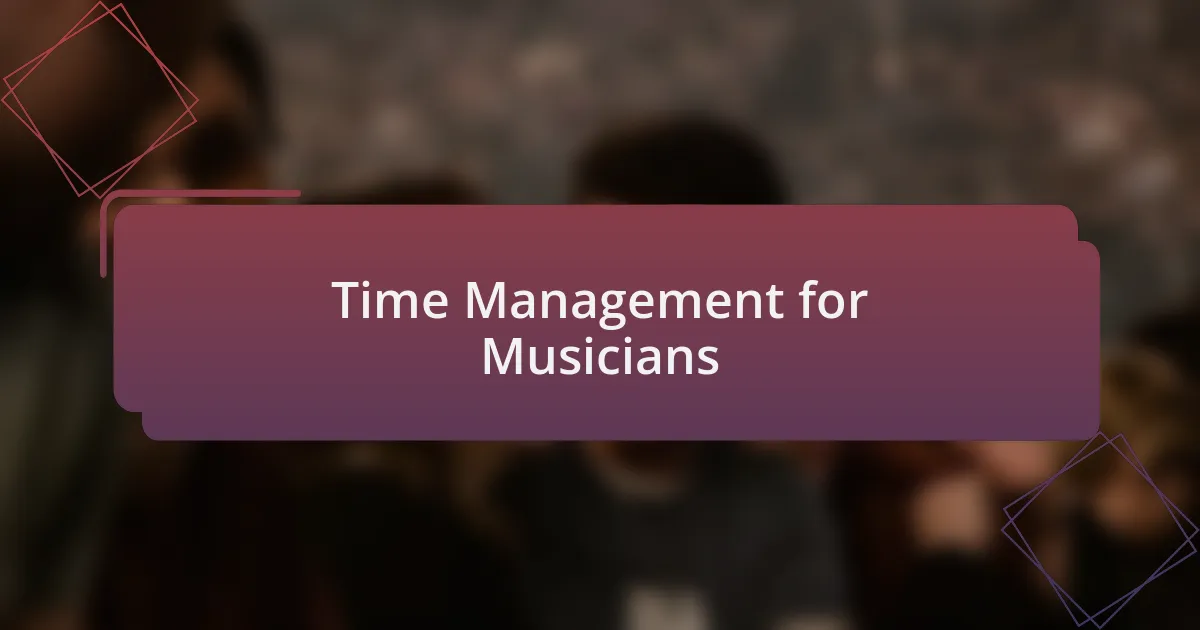
Time Management for Musicians
Effective time management is the backbone of any musician’s life. I’ve learned that scheduling dedicated practice sessions doesn’t just improve my skills; it prevents music from consuming every spare moment. Have you ever caught yourself cramming in practice time at the expense of other essentials? That was me before I adopted a structured approach: blocking out time in my calendar ensures I meet all my commitments, whether it’s band rehearsals, personal practice, or simply taking a moment to breathe.
In my early days, I struggled to fit everything into my daily routine, often leaving me feeling like I was playing catch-up. One solution that worked for me was prioritizing tasks based on deadlines and importance. For instance, when planning for an upcoming show, I’d focus on setlists and equipment checks first. This way, I could channel energy effectively without forgetting crucial elements. Trust me, there’s nothing worse than forgetting gear just because you lost the plot of the schedule!
I find that incorporating breaks into my time management is just as vital as the structured practice times. I used to think relentless effort mattered most, but now I understand that stepping away — even for a short walk — clears my mind and rejuvenates my creativity. Isn’t it fascinating how a little downtime can be the secret ingredient for a killer jam session? By balancing practice with restorative breaks, I’ve discovered a new rhythm that fuels both productivity and passion.
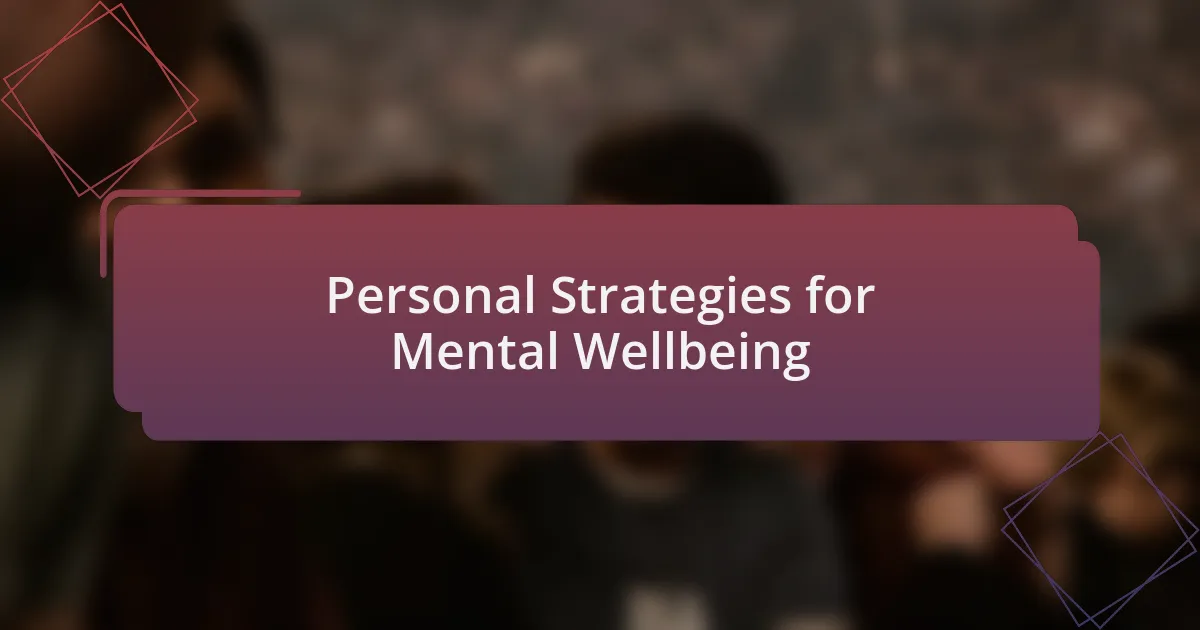
Personal Strategies for Mental Wellbeing
Finding balance in life as a musician often requires more than just time management; it demands a mindful approach to mental wellbeing. I remember a period when the stress of gigs and practice began to weigh heavily on me, leading to feelings of burnout. It was during that time I realized the importance of incorporating mindfulness techniques into my daily routine, such as meditation and deep-breathing exercises. Have you ever noticed how a few quiet moments can help you recenter? Taking just ten minutes each morning to focus on my breath has not only calmed my mind but has also enhanced my focus during rehearsals.
Noticing when stress creeps in is crucial, and I’ve learned to listen to my body more closely. There was a time I ignored signs of tension, pushing through rehearsals without acknowledging fatigue. Now, I practice self-compassion by allowing myself a day off when I feel overwhelmed. That small shift—in recognizing the importance of mental health—has fostered a healthier relationship with music. Think about it: how often do we sacrifice our well-being for that next song? Striking that balance can be transformative for not just your music, but your overall happiness.
Connecting with others who understand this journey can be incredibly supportive. I’ve found that sharing experiences with fellow musicians fosters a sense of community that alleviates stress. Whether it’s venting about a tough gig or discussing creative blocks, these conversations remind me I’m not alone in this pursuit. Have you had those moments of camaraderie? Engaging with peers who resonate with my struggles provides a comforting reminder that we’re all in this together, striving for both musical and personal fulfillment.
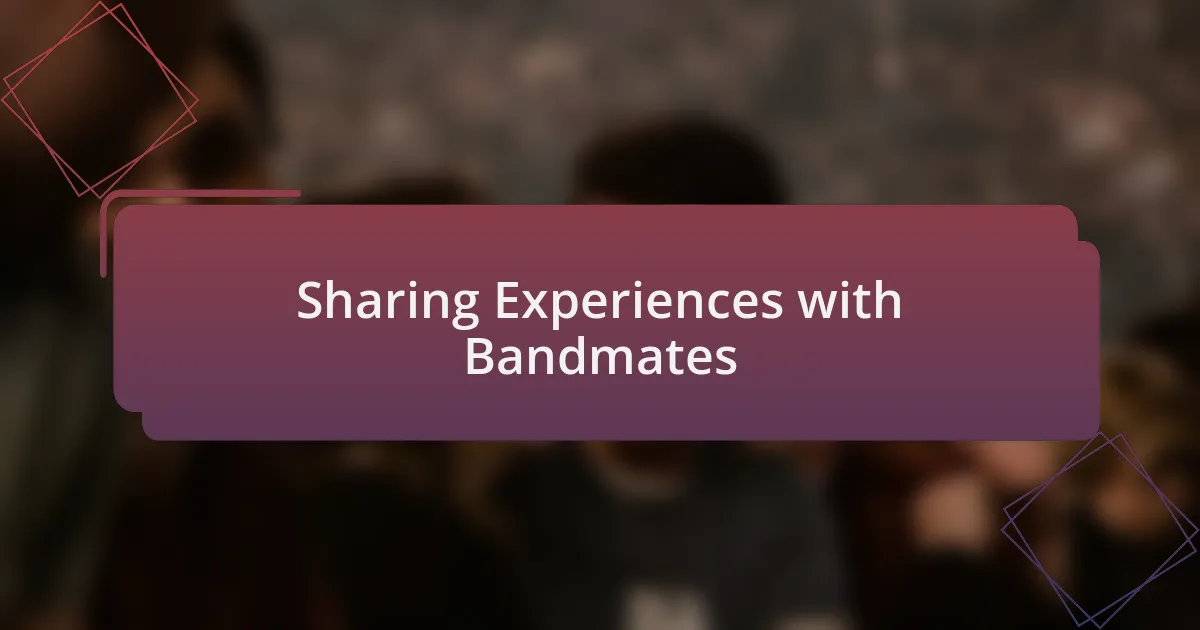
Sharing Experiences with Bandmates
Sharing experiences with bandmates can be a transformative aspect of musical life. I vividly recall a night after a particularly grueling set when we all gathered in our rehearsal space, feeling the weight of the performance. As we shared our thoughts on what went well and what didn’t, I noticed how our vulnerability strengthened our bond. Have you ever felt lighter after simply expressing your fears or triumphs? Those candid conversations not only provided perspective but also turned moments of anxiety into shared laughter and solidarity.
I often find that these exchanges reveal unexpected insights into our craft. For instance, during one rehearsal, we discussed our individual struggles with composing new music. I shared my frustration working on a specific riff, only to discover that my guitarist had faced a similar roadblock. Realizing we weren’t alone in our frustrations sparked a wave of creativity. It prompted us to brainstorm together, and before long, that riff evolved into something fresh and exciting. Isn’t it amazing how collaboration can turn solitary challenges into shared victories?
Reflecting on my journey, I feel grateful for the way sharing experiences ignites passion and motivation among us. There was a time when I hesitated to open up, fearing it might show weakness. However, I’ve learned that authenticity breeds connection. When we celebrate not just our successes but also our struggles, it nurtures resilience within the group. Have you recognized the power of sharing your highs and lows with your bandmates? It reminds us that we are in this together, forging our paths in music as a united front.